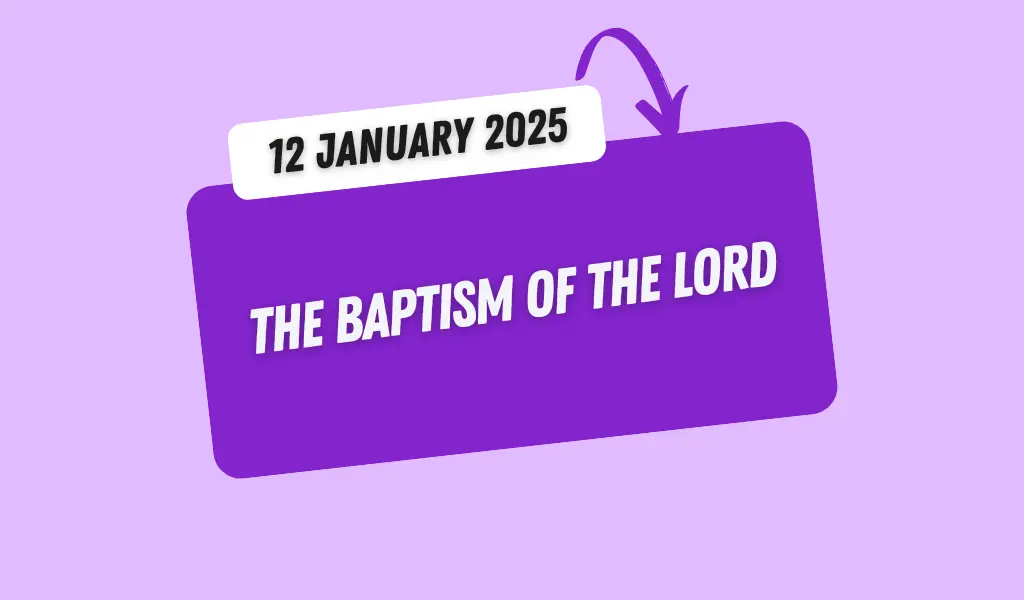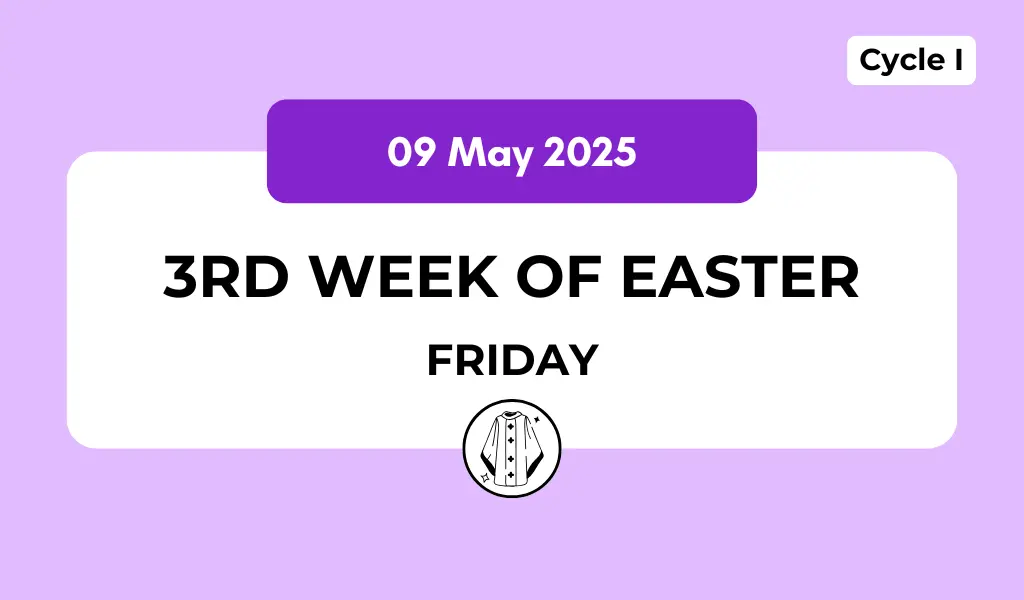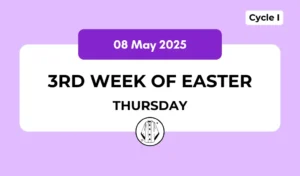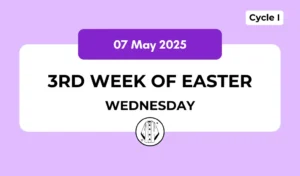Catholic Mass Readings and Reflection January 12, 2025
The Baptism of The Lord
12th January 2025 (Sunday)
Psalter: Proper
Reading of the Day
First Reading: Isaiah 40:1-5, 9-11
Comfort, give comfort to my people, says your God. Speak tenderly to Jerusalem, and proclaim to her that her service is at an end, her guilt is expiated; indeed, she has received from the hand of the LORD double for all her sins. A voice cries out: In the desert prepare the way of the LORD! Make straight in the wasteland a highway for our God! Every valley shall be filled in, every mountain and hill shall be made low; the rugged land shall be made a plain, the rough country, a broad valley. Then the glory of the LORD shall be revealed, and all people shall see it together; for the mouth of the LORD has spoken. Go up on to a high mountain, Zion, herald of glad tidings; cry out at the top of your voice, Jerusalem, herald of good news! Fear not to cry out and say to the cities of Judah: Here is your God! Here comes with power the Lord GOD, who rules by a strong arm; here is his reward with him, his recompense before him. Like a shepherd he feeds his flock; in his arms he gathers the lambs, carrying them in his bosom, and leading the ewes with care.
Psalm 104:1b-2, 3-4, 24-25, 27-28, 29-30 (R. 1)
R/. O bless the Lord, my soul
Second Reading: Titus 2:11-14; 3:4-7
Beloved: The grace of God has appeared, saving all and training us to reject godless ways and worldly desires and to live temperately, justly, and devoutly in this age, as we await the blessed hope, the appearance of the glory of our great God and savior Jesus Christ, who gave himself for us to deliver us from all lawlessness and to cleanse for himself a people as his own, eager to do what is good. When the kindness and generous love of God our savior appeared, not because of any righteous deeds we had done but because of his mercy, He saved us through the bath of rebirth and renewal by the Holy Spirit, whom he richly poured out on us through Jesus Christ our savior, so that we might be justified by his grace and become heirs in hope of eternal life.
Gospel Acclamation
V/. Alleluia
R/. Alleluia
V/. John said: One mightier than I is coming; he will baptize you with the Holy Spirit and with fire.
R/. Alleluia.
Gospel : Luke 3:15-16, 21-22
The people were filled with expectation, and all were asking in their hearts whether John might be the Christ. John answered them all, saying, “I am baptizing you with water, but one mightier than I is coming. I am not worthy to loosen the thongs of his sandals. He will baptize you with the Holy Spirit and fire.” After all the people had been baptized and Jesus also had been baptized and was praying, heaven was opened and the Holy Spirit descended upon him in bodily form like a dove. And a voice came from heaven, “You are my beloved Son; with you I am well pleased.”
Daily Gospel Reflection
The Baptism of The Lord
Guidelines: The feast of the Baptism of the Lord shows Jesus’ dedication to the mission of saving humanity and reminds us of our own responsibility to live according to our baptismal calling.
1. Today, Jesus is baptized. But does He really need baptism?
Certainly not. For the Jews, baptism signifies recognizing and accepting one’s sins, repenting, seeking God’s mercy, and receiving forgiveness and cleansing. However, Jesus, as the sinless Son of God, has no need for forgiveness or purification. So, why was He baptized? The baptism of Jesus has a deeper purpose aligned with God’s plan of salvation.
2. Even though Jesus is sinless, He becomes one of us—sinful beings needing salvation. Though pure, He identifies with us, the impure, needing cleansing. Though whole, He joins us, the broken, needing healing. Though one with the Father, He aligns with us, the estranged, needing reconciliation. Even though He delights the Father, He becomes like us, those who displease God, to restore us.
3. Jesus becomes the Lamb of God, taking our sins upon Himself, carrying our burdens, and offering us freedom from our struggles and weaknesses. His baptism is not just a tradition or ritual; it is deeply symbolic, representing three key aspects:
- The cleansing of sins.
- Integration into God’s chosen people.
- The beginning of a mission of repentance and transformation.
4. In His baptism, Jesus symbolizes the purification we need. Though sinless, He humbles Himself to stand among us, demonstrating the importance of cleansing from sin. His baptism shows His unity with God’s people and His participation in humanity’s reality, especially in the fight against sin and the need for liberation.
5. Jesus’ baptism marks the start of His mission. By entering the waters, He steps into His mission of cleansing through repentance and conversion. The heavenly voice proclaiming Jesus as the beloved Son confirms His anointing by the Spirit for this mission.
6. The first and second readings affirm His role as the chosen one, pleasing to God. God is with Him, anointing Him with the Spirit and power for a mission of justice, fairness, and liberation. He is the Covenant of the Lord, a light to the nations, restoring sight to the blind and freeing the oppressed.
Application to Us
7. The Baptism of the Lord also reminds us of our own baptism and the mission it calls us to fulfill. It reminds us of our identity and purpose. God chose us, formed us, holds us close, and filled us with His Spirit. We belong to God, not to evil. Through baptism, we are made God’s children, sealed as His people, and united in one divine family with Christ. We share His life, are anointed by the Spirit, and are consecrated to serve God alone.
8. But our baptismal calling doesn’t end with personal blessings. It drives us to a mission. We are meant to be a covenant, a light to the nations, and agents of liberation. Our mission is to establish justice and freedom, reflecting God’s reign.
9. As baptized individuals, we are called to experience, nurture, and spread grace instead of sin, virtue instead of vice, goodness instead of evil, holiness instead of impurity, divine power instead of weakness, light instead of darkness, unity instead of division, and closeness with God instead of separation. We must embrace humility over pride, reconciliation over revenge, and a commitment to God’s values over self-centeredness.
Practice: We must live our baptism daily. It is not just a ritual to remember but a call to repentance, conversion, and transformation—not only for ourselves but also for others.







